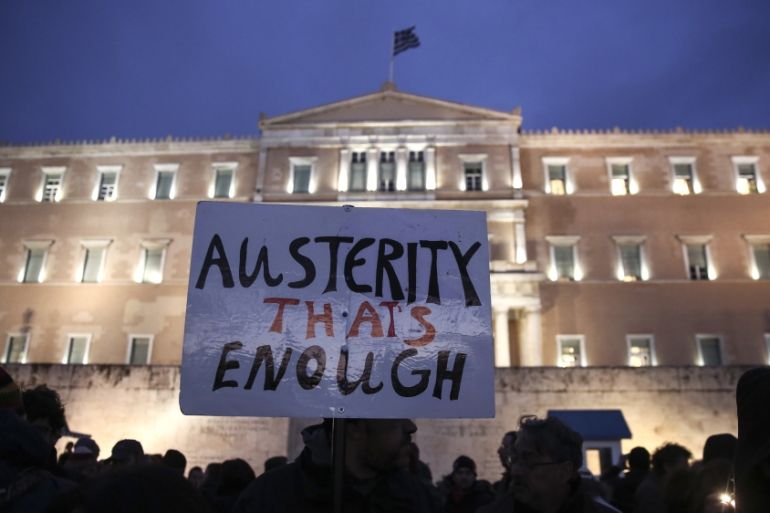Defiant Greeks weigh worst-case scenarios
Right now, Athens is a surprisingly upbeat place; the next two weeks will be critical, however.

‘So have you done it yet?’
It’s the question my friends in Athens are asking each other these days. By “it”, they mean taking one’s money out of the bank.
Keep reading
list of 4 itemsWhy are nations racing to buy weapons?
Parallel economy: How Russia is defying the West’s boycott
US House approves aid package worth billions for Ukraine, Israel
In other words, making sure that you have a precious stash of euros in cash stored under the bed, should the worst happen and Greece be forced out of the euro zone.
There has been no breakthrough in talks between Greece and its foreign creditors, and everyone is wondering what will happen next.
“I went to the bank yesterday,” one friend says, “and took some money out. I don’t think we’re going back to the drachma, but there’s a risk of capital controls being imposed.”
A sensible precaution, although my friend is also astute enough to know that by withdrawing funds from a Greek bank, she’s playing her own [very small] part in exacerbating the problem. Because if everyone in Greece does panic, and withdraws all their savings, the banks surely will collapse.
“I only took a modest sum out,” my friend said, adding “but you should have seen the guy before me in the queue … he took everything he had, and the bank workers did not look happy with him.”
I bump into a former minister from a previous government, and ask him whether he’s optimistic about the talks in Brussels.
“It’s fifty-fifty,” he replied, grimacing.
So is he taking his money out of the bank, just in case?
He says that, unfortunately, he doesn’t have much to withdraw. This is what many Greeks tell me, and usually I believe them, but in the case of the former minister the answer strikes me as somewhat implausible.
No panic yet
In truth, there is no panic.
This Reuters story says that the rate of withdrawals from Greek banks has slowed in February, compared to January.
This week, I watched as a crowd of several thousand people braved an extremely cold night to assemble outside parliament.
Unlike so many previous demonstrations in Athens during five years of financial and economic crisis, this one was called in support of the government.
These people had come not to bury their politicians but to praise them.
“I feel our new government is trying to do the right thing, so I should show my support,” a young woman called Despina told me.
Nearby one man holds up a placard that reads “All We Are Saying Is Give Greece A Chance”. Another placard reads, “We Are Not Merkel’s Colony”.
It’s a peaceful crowd, and there’s not a policeman in sight. Things could change quickly.
If Alexis Tsipras, prime minister, is forced into major concessions, then his domestic supporters will feel betrayed. If the talks break down, alarm will spread.
But right now, Athens is a surprisingly upbeat, even defiant place. The next two weeks will be critical.
Follow Barnaby Phillips on twitter @barnabyphillips